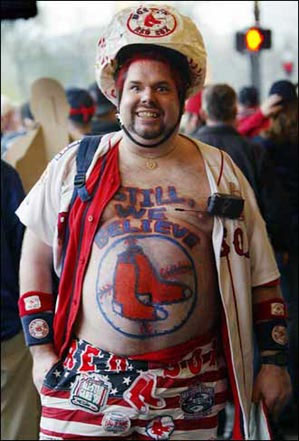 Let me take a quick moment to describe my feelings toward Joe Torre. A few years ago, my girlfriend and I went to a planetarium exhibit that was narrated by Robert Redford. As Redford was narrating the potential of an apocalyptic meteor that would ravage our solar system, my girlfriend turned whiter than David Eckstein. I, on the other hand, felt surprisingly calm. Even as Redford was describing the end of humanity, I was unfazed. Anyway, as we walked out of the planetarium, I turned to my then-girlfriend and asked that if I was ever to be told terrible news, I wanted her to promise me that she would either get Redford, Morgan Freeman, or Joe Torre to deliver the literal death blow. In between stifled laughs, she asked, “Why?”
Let me take a quick moment to describe my feelings toward Joe Torre. A few years ago, my girlfriend and I went to a planetarium exhibit that was narrated by Robert Redford. As Redford was narrating the potential of an apocalyptic meteor that would ravage our solar system, my girlfriend turned whiter than David Eckstein. I, on the other hand, felt surprisingly calm. Even as Redford was describing the end of humanity, I was unfazed. Anyway, as we walked out of the planetarium, I turned to my then-girlfriend and asked that if I was ever to be told terrible news, I wanted her to promise me that she would either get Redford, Morgan Freeman, or Joe Torre to deliver the literal death blow. In between stifled laughs, she asked, “Why?”
Well, Redford and Freeman for obvious reasons: their gravitas, combined with soothing voices, could almost make diagnosis of a terminal illness palatable. Torre fit into that group simply because he embodied everything great about the thing I loved most: baseball. Regardless of whether most people either love or hate the Yankees, they probably have pretty good feelings about Joe. As the only manager to ever conquer George Steinbrenner and cancer, he did so while winning four World Series championships. In addition, he’s also a pretty great guy. To me, that makes Joe pretty damn awesome.
Now with my bias out of the way, Torre recently disclosed he is leaning toward coming back to manage the Dodgers for one more season in 2011 at age 70. With a young core of players just entering their prime, Torre would like one more shot at a World Series if they fall short in 2010. As much as I hate myself for admitting this: I’m almost certain it won’t happen - he’s too old.
Ok, so I’m not entirely sure that’s the case. After all, while John McGraw won his last World Series title at age 49 (ten seasons before retirement), Casey Stengel won his last Series as a 67 year-old in 1958. Nonetheless, let’s take a look at the ages of Series-winning managers since the modern Wild-Card era began in 1995 (age in parenthesis):
2009: J. Girardi (44)
2008: C. Manuel (64)
2007: T. Francona (48)
2006: T. LaRussa (61)
2005: O. Guillen (41)
2004: T. Francona (45)
2003: J. McKeon (72)
2002: M. Scioscia (43)
2001: B. Brenly (47)
2000: J. Torre (59)
1999: J. Torre (58)
1998: J. Torre (57)
1997: J. Leyland (52)
1996: J. Torre (55)
1995: B. Cox (54)
Other than the fact that it really helps if your first name starts with a “J,” since 1995, the average age of a World Series-winning manager has been 53.3 years. If we take out the outliers, McKeon at age 72 and Guillen at age 41, the average lowers to 52.8. If we remove Torre’s repeat titles (’99-’00), we get 52.5.

"Trader" Jack McKeon took over a losing team in May 2003 and turned them into World Series Champions. Two years later, he was gone.
Let’s look at the older outlier: McKeon. McKeon’s championship story is an interesting one – the Marlins started the 2003 season 16-22 before they fired Jeff Torborg in May. The common assumption is that McKeon took a team with a ridiculously-young pitching staff (the oldest was barely-used reliever Armando Almanza at 30) and a bunch of twenty-somethings and defeated Torre’s Yankees in six games. Not so fast: guiding his pitching staff was Hall of Fame catcher Ivan Rodriguez who at age 31 was by no means a rookie (he was a regular by age 20). And while none of his other regulars were past age 30 (five were between 27-30), his entire bench was full of guys in their 30’s. Add in the grueling ALCS that year, a Mark Prior breakdown (thanks to Dusty Baker) and a little Steve Bartman in Game 6 of the NLCS… And maybe “Trader” Jack isn’t so lucky.
Alright, enough of my feeble attempt to emulate the great Joe Posnanski - what’s my point? Well, given teams’ increased reliance on market inefficiencies, organizations continue to find themselves using younger (and cheaper) players to enjoy greater rates of return. The sport’s slow decline in free agent spending hasn’t helped increase the number of job opportunities for the sport’s veterans, either.
So, what do we get – the assumption that younger managers relate more closely with younger players? Perhaps culturally, but also because maybe they are closer to their bus-riding days in the minors as opposed to 81 road nights at the Four Seasons. Or conceivably, some of these guys were actually playing in the show just a few years before. Going back to McKeon, he eventually resigned two seasons after his World Series triumph because of his “gruff demeanor” in failing to relate to his players.

Fans of Joe have probably seen this for the last time.
And then there is always the tried and true “game has passed him by” argument. At the end of Torre’s tenure with the Yankees, it had become quite apparent he relied too heavily on certain veteran relievers, much to their detriment and ultimate demise. In LA, similar accusations have followed.
While the current Dodgers lineup is stocked with a few veterans, the core of this group is still relatively young, especially the pitching staff. Factoring in Torre’s recent pitching management mishaps, and we have a major red-flag for the 2010 and 2011 Dodgers.
For Torre’s sake, I hope I’m wrong. I’d love to see him take a shot at redemption, especially against the Yankees. Unfortunately, I don’t think the numbers are in his favor. Maybe 2011 will be a bridge year for the organization as they try to transition ownership out of a messy divorce and into new leadership. New leadership that will probably include a new manager: current Dodger hitting coach Don Mattingly. By then, he’ll only be 50.
 As you may have noticed, I’ve been away for a few weeks. Something happened to me in recent days that really forced me to sit back and reconsider a lot of things in my life: I turned 30.
As you may have noticed, I’ve been away for a few weeks. Something happened to me in recent days that really forced me to sit back and reconsider a lot of things in my life: I turned 30. 








